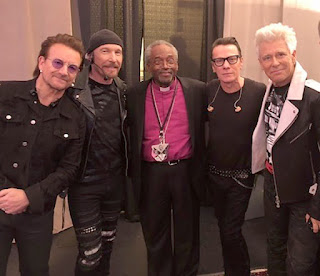The Presiding Bishop and U2
[Episcopal News Service] Presiding Bishop Michael Curry
met backstage this week with U2 and front man Bono at New York’s Madison Square
Garden, where the Episcopal Church leader and the globally renowned rockers
discussed Curry’s Reclaiming
Jesus initiative.
The meeting happened in the evening June 25 just before the
first of a series of U2 concerts in New York on the band’s Experience +
Innocence tour. A photo released by the band shows the foursome posing with
Curry.
“I know of no other group that has sung and witnessed more
powerfully to the way of love than U2,” Curry said June 27 in a written
statement to Episcopal News Service. “It was a real blessing to sit with them
to talk about Jesus, the way of love, and changing our lives and the world.
They are an extraordinary community gift to us all.”
U2, which formed in the late 1970s, has been one of the most
popular rock bands in the world for more than 30 years, and Bono – among that
rarefied group of musicians known globally by a single name – makes headlines
these days as much for his support for humanitarian causes as for his music.
Curry, too, has become something of a minor global celebrity
since his sermon on the power of love at the royal wedding on May 19. After the
wedding, he was invited to discuss the sermon on a dizzying variety of media outlets, from the BBC to
celebrity gossip site TMZ. Curry told ENS last month that he sees the sudden
attention as a unique opportunity for evangelism, as he tries in interviews to
bring the conversation around to what he often calls the “Jesus Movement.”
Reclaiming Jesus is a new initiative he spearheaded this year with the Rev.
Jim Wallis of Sojourners to address “a dangerous crisis of moral and political
leadership at the highest levels of our government and in our churches” and to
affirm what it means to be followers of Jesus in today’s world.
U2 and Bono have not yet commented publicly on Reclaiming
Jesus, though Curry said he spoke with them about its origins and intention.
“I shared with them our commitment to reclaim Jesus of
Nazareth as the center of Christian faith and life,” Curry said in his
statement to ENS. “And this means a way of faith with love of God and Love of
neighbor at the core. A love that is not sentimental but a disciplined
commitment and spiritual practice infusing every aspect of life, personally,
intra personally and politically.”
Curry didn’t say whether he was a fan of U2’s music, though
he stayed June 25 to attend the concert at Madison Square Garden. He had at
least one prior connection to the songs before this week: A sermon he delivered
in 2006 at a U2charist service in Columbus, Ohio.
The U2charists were a popular trend in the Episcopal Church
at that time, structured as a Eucharist that incorporates songs from the band,
whose catalogue is thoroughly infused with Christian imagery.
Celebrating a U2charist also held a deeper purpose, calling
attention to the push to achieve the United Nations’ Millennium Development Goals, such as eradicating extreme
poverty, reducing child mortality and fighting HIV/AIDS, malaria and other
diseases. The ONE Campaign, co-founded by Bono, was a key advocate for the
Millennium Development Goals – U2’s megahit “One” became its rallying cry – and
the Episcopal Church endorsed the organization’s work in a 2006 General Convention resolution.
More than 700 attended the U2charist in Columbus in 2006.
Curry, the bishop of North Carolina at the time, preached in support of the
Millennium Development Goals and the ONE Campaign, telling those gathered to
“be a witness” for Christ. He called the goals “a way for us to discover life
again as a Church … a compelling vision of the world God intended from the
beginning,” according to an ENS report on the service.
It wasn’t clear whether Curry referenced U2’s music directly
in the sermon, though in one
unconfirmed transcription of the sermon he is quoted as referring to
the band’s leader as “Brother Bono.”
– David Paulsen is an editor and reporter for the
Episcopal News Service. He can be reached at dpaulsen@episcopalchurch.org.

